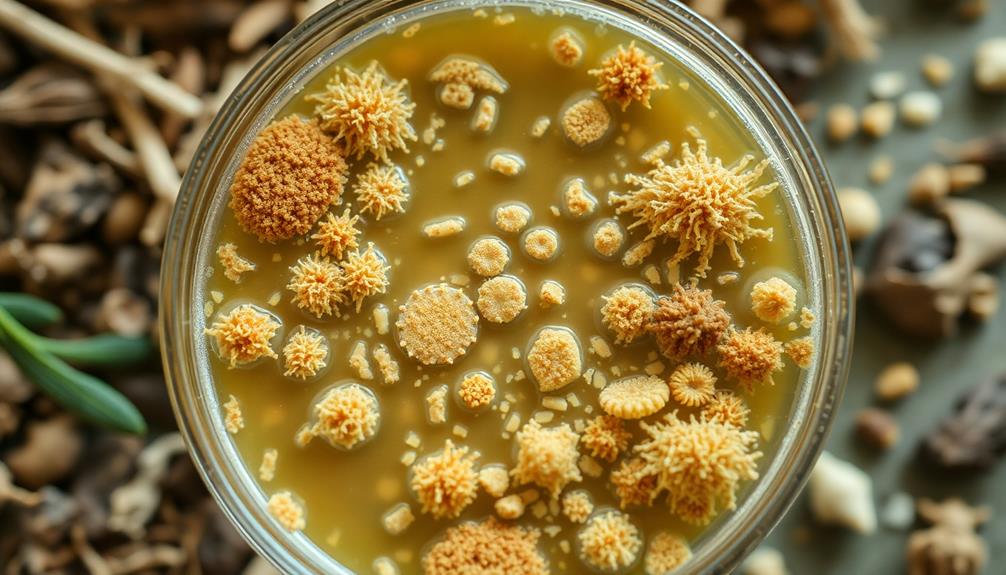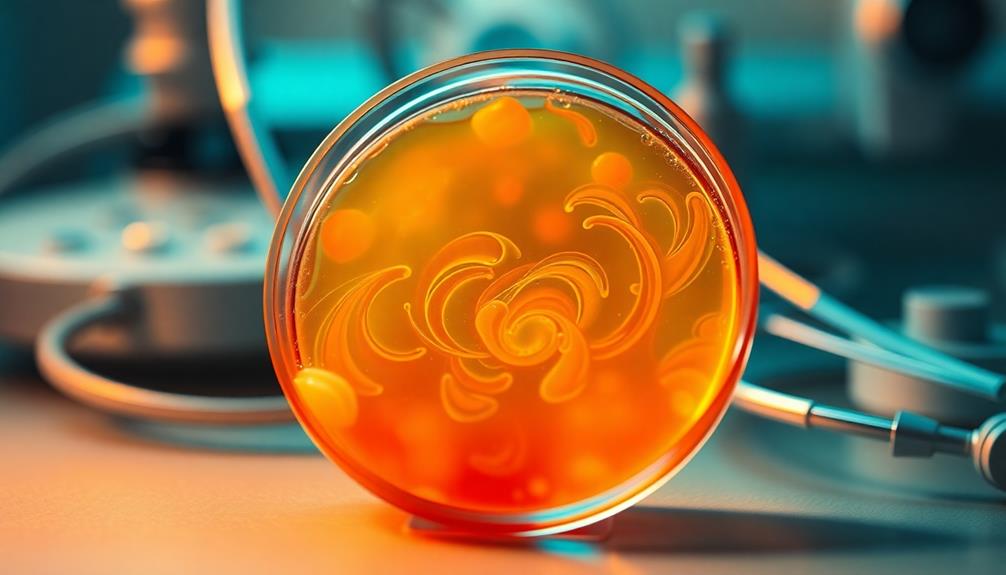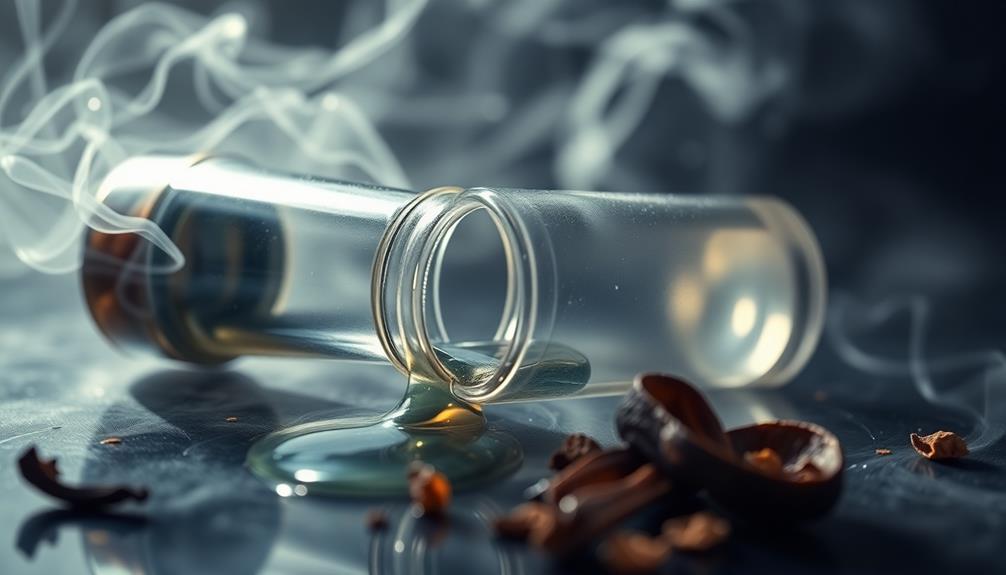A yeast infection usually has a mild and sweet smell that some describe as similar to bread or beer. You might notice it with thick, white discharge that looks a bit like cottage cheese. It's important to remember that this smell isn't strong and often doesn't carry a strong odor at all. If you ever smell something fishy, that could mean something else, like bacterial vaginosis. Always pay attention to your body and unusual changes, as they might mean it's time to talk to a doctor. Stick around, and you might find even more helpful tips about staying healthy!
Key Takeaways
- Yeast infections typically have a mild, sweet, or beer-like odor, unlike the strong fishy smell of bacterial vaginosis.
- The discharge during a yeast infection is thick, white, and resembles cottage cheese, usually lacking a strong odor.
- Sudden changes in odor may arise from diet, hormonal changes, or hygiene, but strong odors should prompt medical consultation.
- Good hygiene practices and maintaining dryness can help prevent yeast infections and associated odors.
- Emotional stigma around yeast infections can lead to feelings of shame; open conversations can promote better understanding and support.
Introduction

When dealing with a yeast infection, you might notice a distinct smell that can raise concerns. It's important to remember that yeast infections usually have a mild, sweet, or yeasty odor, unlike some other vaginal infections.
If you notice an unusual vaginal odor, don't panic! The thick discharge that comes with a yeast infection often looks like cottage cheese and usually doesn't have a strong smell.
Unlike bacterial vaginosis, which is known for a strong, fishy odor, yeast infections smell are much milder. Some women might notice a slight odor, but it's not typically something to worry about.
Keeping an eye on your health is key, and if you detect a strong or unusual odor along with other symptoms, it might be a sign of a different infection. In that case, it's best to seek a medical consultation.
Description of the Smell

A yeast infection's smell can be quite subtle, often described as mild, sweet, or even reminiscent of beer. You might notice this gentle odor alongside thick, white vaginal discharge that looks a bit like cottage cheese.
It's important to know that while this mild yeast-like smell might be present, strong or fishy odors usually point to other common vaginal infections, like bacterial vaginosis.
Your health is important, so if you notice a sudden change in odor, pay attention! Sometimes, factors like what you eat, hormonal changes, or hygiene practices can affect the smell.
However, if you ever experience a stronger, foul odor, it's a good idea to consult a healthcare provider.
Source and Composition

Yeast infections stem from an overgrowth of the fungus Candida, a microorganism that naturally exists in the vagina in balanced amounts. When everything is working well, you have a healthy vagina with balanced vaginal flora. However, sometimes, Candida can multiply too much, leading to a yeast infection. This overgrowth of yeast can cause thick, white discharge that looks a bit like cottage cheese.
The smell of vaginal discharge during a yeast infection isn't usually strong or unpleasant. Some women might notice a sweet or yeasty smell, but it's often mild or even absent. This is different from the unpleasant odors you might associate with bacterial infections.
It's important to remember that the smell of a yeast infection isn't a reliable way to judge how bad the infection is. Many women have little to no odor, even when they've an active infection.
Your diet can also play a role in this. Eating a lot of sugar may lead to higher sugar levels in your body, which can contribute to the overgrowth of yeast.
Taking care of your vaginal health is key to keeping everything in balance!
Typical Scenarios or Environments

Certain environments and situations can increase your risk of developing a yeast infection. For example, if you wear tight-fitting clothing or wet swimwear, you might trap moisture in your vaginal area. This moisture creates the perfect environment for yeast to grow, which can lead to a mild smell, often described as sweet or similar to beer.
You might also notice changes in odor if you've recently taken antibiotics. These medicines can cause a disruption in the natural balance of bacteria, making it easier for yeast to take over.
Hormonal changes, like those during pregnancy or menstruation, can also encourage yeast overgrowth, leading to unusual smells.
If your health isn't at its best and you have a compromised immune system, you're even more likely to encounter these odors. Remember, your body's balance is important!
Keeping your environment dry and wearing breathable fabrics can help. So, next time you notice a smell that seems out of the ordinary, think about these scenarios. With a little awareness, you can help maintain a happy and healthy vaginal area!
Emotional or Cultural Associations

Vaginal health is often shrouded in stigma, leaving many feeling ashamed or embarrassed about yeast infections and their associated odors. You might think that if something smells, it means you aren't practicing good personal hygiene. But that's not true! Yeast infections can happen to anyone, even those who keep clean.
This misconception can lead to emotional distress, making you feel anxious when you experience a vaginal odor. Cultural beliefs play a big role in how people view vaginal health. In some cultures, there's a huge focus on being odor-free, which can make you feel even more pressured.
It's important to remember that yeast infections are medical issues, not a reflection of your cleanliness or worth. Having open conversations about yeast infections can help break down the stigma. Education is key!
When people talk and share their experiences, it can help others feel less alone. So, don't be afraid to ask questions or seek help. Understanding yeast infections and their smells is part of taking care of your feminine health.
You're not alone in this, and it's okay to reach out for support!
Health or Safety Considerations

When dealing with a yeast infection, it's crucial to recognize the health implications associated with its symptoms. A vaginal yeast infection, also known as vulvovaginal candidiasis, often brings some discomfort, like itching and irritation.
However, you might notice that the vaginal odors are usually mild, sweet, or yeasty rather than strong or foul. This is different from other infections, like bacterial vaginosis, which can have a pronounced fishy smell.
If you have thick, white, and lumpy infected discharge, it's usually not very smelly. Keeping good hygiene is important for your health. It helps maintain a balanced vaginal pH and supports healthy bacteria. Regular washing with mild, unscented soaps can help manage discomfort and prevent irritation. It’s also important to recognize different types of vaginal discharge smells, as they could indicate various infections or imbalances. If you notice unusual odors, it may be a sign to consult with a healthcare provider for further evaluation.
If you ever notice a strong or foul odor, it could mean there's something else going on, and you should seek medical advice.
Always remember, a clinical diagnosis from a healthcare professional is the best way to ensure you get the right treatment. So, if you're concerned about your symptoms, don't hesitate to reach out for help!
Taking care of yourself is the best way to feel better and stay healthy.
Final Thoughts

Understanding the nuances of yeast infections can help you manage your health more effectively. When you think about yeast infections, remember they usually have a mild, sweet, or yeasty odor, often like beer or bread. This is different from bacterial vaginosis, which has a stronger fishy smell.
If you notice a thick, white discharge that looks like cottage cheese, you might've a yeast infection. Sometimes, women don't smell anything at all during a yeast infection. But, if you do notice a slight change in odor, it could mean there's an imbalance of yeast and bacteria in your vagina.
If you experience strong odors, itching, or unusual discharge, it's a good idea to talk to your healthcare provider. This can help you figure out if it's just a yeast infection or something else that needs attention.
Taking care of your vagina is essential for your overall health. By understanding these signs, you can be more aware of your body. So, keep an eye on any changes, and don't hesitate to ask questions. You deserve to feel your best!
Frequently Asked Questions
Can You Smell a Yeast Infection?
You might notice a slight odor during a yeast infection, but it's usually mild. If you detect a strong or foul smell, it could indicate another infection. Consulting a healthcare professional is a smart move.
What Does BV Smell Like?
Bacterial vaginosis typically smells fishy, especially after sex. You might notice a strong odor combined with a thin, grayish-white discharge. If it's persistent or bothersome, you should consult a healthcare professional for advice.
How Do You Tell if You Have BV or a Yeast Infection?
To tell if you have BV or a yeast infection, pay attention to symptoms. BV usually has a fishy odor and thin discharge, while a yeast infection causes intense itching and thick, lumpy discharge.
Why Can I Smell Myself Through My Pants?
If you can smell yourself through your pants, it could be due to moisture or hygiene issues. Tight clothing and dampness can trap odors, so consider wearing breathable fabrics and practicing good hygiene for freshness.









